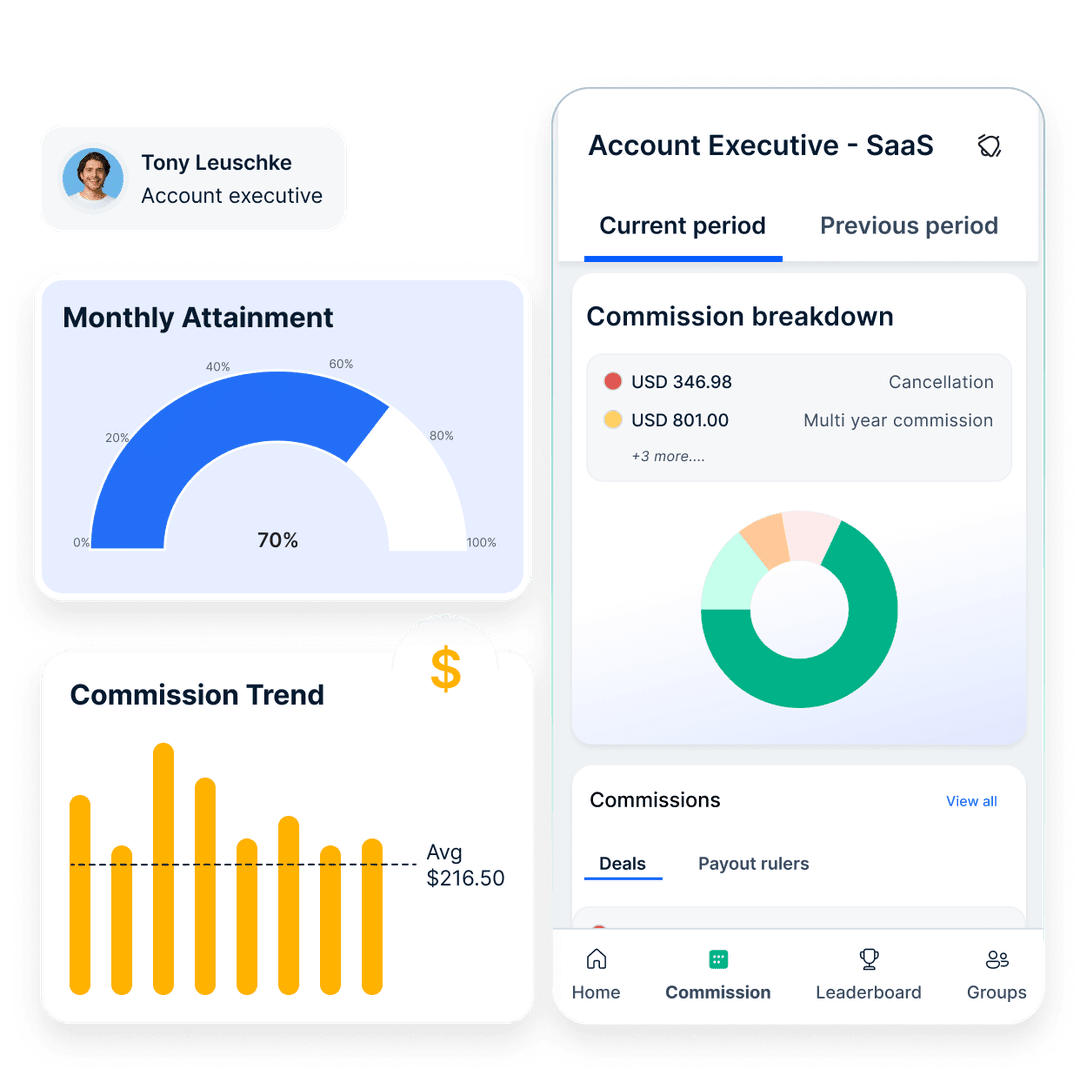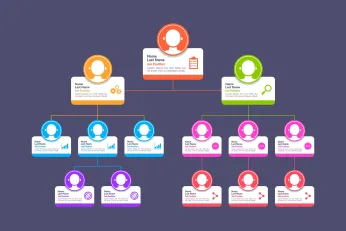15 formas eficaces de mejorar la productividad de las ventas
Aumentar la productividad de las ventas no consiste sólo en trabajar más, sino en trabajar de forma más inteligente. Esta guía explora 15 formas prácticas de mejorar la productividad de las ventas, ayudándole a agilizar los procesos, mejorar el compromiso con el cliente y cerrar acuerdos de forma más eficiente.
En esta página
Los equipos de ventas se encuentran a menudo atrapados entre la prospección, el seguimiento y el cierre de tratos, pero la productividad no consiste sólo en trabajar más horas. Se trata de trabajar de forma más inteligente. Saber cómo mejorar la productividad de las ventas significa centrarse en la eficiencia, eliminar los obstáculos y utilizar las estrategias adecuadas para cerrar acuerdos más rápido.
Tenga en cuenta que sólo 39% del tiempo de un comercial se dedica a interactuar con clientes potenciales o a nutrir a los clientes potenciales. El resto se dedica a actividades improductivas, prospección y tareas administrativas que no implican venta directa. Esto pone de manifiesto la necesidad de un enfoque estructurado para aumentar la productividad de las ventas, garantizando que el tiempo se emplea donde más importa.
Desde la optimización de los métodos de difusión hasta el aprovechamiento de las herramientas de automatización, los pequeños cambios pueden dar lugar a resultados significativos.
En esta guía compartiremos formas prácticas de mejorar la productividad de las ventas, proporcionándole las herramientas para maximizar la eficiencia, mejorar el compromiso e impulsar mejores resultados de ventas.
¿Qué es la productividad de las ventas?
La productividad de las ventas mide la eficacia con la que una organización utiliza los recursos, las herramientas y los procesos para alcanzar los objetivos empresariales y, al mismo tiempo, minimizar el tiempo y el coste necesarios para cerrar acuerdos. Las empresas que se centran en cómo mejorar la productividad de las ventas se aseguran de que los equipos de ventas dediquen más tiempo a vender y menos a tareas improductivas.
La productividad se refiere a la eficacia con la que se consiguen resultados en un plazo determinado. Por ejemplo, si una tarea lleva originalmente cuatro horas pero puede completarse en dos, la productividad se ha duplicado.
En ventas, la productividad se mide por lo bien que los equipos utilizan los procesos, recursos y tiempo disponibles para impulsar el crecimiento de los ingresos. Las organizaciones que aplican las estrategias adecuadas para aumentar la productividad de las ventas pueden mejorar la eficiencia, optimizar los flujos de trabajo y mejorar el rendimiento general de las ventas. Se puede realizar un seguimiento de la productividad a varios niveles, desde representantes de ventas individuales hasta departamentos enteros, lo que garantiza mejoras constantes en los resultados y los ingresos.
La productividad de las ventas en el centro
En esencia, la mejora de la productividad de las ventas puede resumirse en cuatro principios operativos que rigen a las personas y los procesos. Aunque universales, es fácil pasar por alto estos principios básicos en el entorno de las ventas virtuales. Son los siguientes:
1. Coherencia en el funcionamiento
Para crear un entorno propicio a la productividad, es esencial establecer una firme estructura organizativa de ventas. El sistema básico actúa como marco, pero sigue permitiendo a los representantes individuales la autonomía necesaria para cambiar pequeñas cosas y adaptarlas a su estilo.
Establecer el horario y la estructura de la jornada del representante y sus prácticas de venta puede contribuir en gran medida a crear buenos hábitos de venta. Las lecciones aprendidas pueden aplicarse a otros y mejorar el proceso.
2. Concentración y distracción
Los representantes de ventas sólo están a veces en su elemento para rendir al máximo con los clientes potenciales a lo largo del día. Eliminar las distracciones y trasladar las tareas improductivas a otros momentos del día es esencial para garantizar que aprovechan sus mejores horas. Cualquier cosa que interfiera en la concentración debe solucionarse rápidamente, o la productividad puede caer con rapidez.
3. Innovación constante
Al cabo de un tiempo, los comerciales se adaptan a un patrón y cumplen las cuotas asignadas. También le dirán que las cosas van bien cuando se les pregunte por su trabajo. Este es el primer signo de estancamiento, ya que los malos hábitos y la ineficacia pueden introducirse rápidamente en el proceso de ventas.
Con la rápida evolución del sector de las ventas, es esencial innovar en múltiples sectores, como las herramientas utilizadas, las operaciones, la formación de los representantes de ventas y todo aquello que pueda mejorar el rendimiento.
4. 4. Cultura del trabajo
Una gran cultura de trabajo puede marcar la diferencia entre la productividad de las ventas y un bajón en el rendimiento. Los representantes de ventas trabajan en un entorno de mucho estrés, lidiando con el rechazo de los clientes y el cumplimiento de las cuotas de ventas.
Aunque la competencia sana y la gamificación pueden aumentar la productividad, es esencial vigilar el agotamiento. Una cultura de trabajo motivadora que mantenga altos niveles de compromiso es necesaria para mantener la productividad.
¿Qué factores afectan a la productividad de las ventas?
Varios factores influyen en el rendimiento de las ventas, como:
- Incoherencias en las estrategias de venta y mala planificación del proceso de venta
- Un entrenamiento de ventas ineficaz o una formación deficiente dejan lagunas de conocimientos y habilidades en los representantes.
- Presión excesiva para rendir y expectativas poco realistas
- Programación y planificación de rutas inadecuadas
- Falta de comunicación de arriba abajo o entre departamentos
- Prioridades de la actividad de ventas vagamente establecidas
- Resistencia a adoptar herramientas o tecnología o uso excesivo de herramientas que crean caos
- Falta de alineación entre ventas y marketing y mala comunicación
- Perfiles de cliente ideal (PCI) vagamente establecidos
- Dinámica cambiante en el embudo de ventas
- Distracciones y procesos ineficaces que hacen perder el tiempo a los representantes
- Mala cultura de ventas, la negatividad que genera desconfianza y resentimiento

Impulse la productividad de las ventas con incentivos inteligentes
Compass automatiza las comisiones, proporciona información en tiempo real y mantiene a su equipo motivado con la gamificación. Aumente la eficacia, controle el rendimiento sin esfuerzo y convierta los objetivos de ventas en logros.
Optimice el rendimiento de ventas ahora
¿Cómo pueden los jefes de ventas medir la productividad de las ventas?
Medir la actividad de ventas es importante para conocer el funcionamiento de la estrategia de ventas y el rendimiento de los representantes y los equipos. Cuando sus representantes de ventas son productivos, se empieza a notar en diferentes métricas e indicadores clave de rendimiento. He aquí cómo medirlo:
1. Observe el número y la calidad de las interacciones con los clientes
Aunque sus representantes estén ocupados marcando, es posible que necesiten conversaciones más significativas que terminen en conversiones. Es esencial hacer un seguimiento de las métricas telefónicas, como el número de llamadas, la duración de las conversaciones (especialmente con clientes potenciales cualificados) y las citas. Una buena herramienta de ventas o un CRM pueden rastrear y medir los correos electrónicos y las llamadas y filtrar las interacciones de alta calidad con los clientes.
2. Observar el progreso de la tubería
Tiene que haber algo más que una vaga idea sobre la oportunidad en tramitación. Los representantes necesitan una mejor resolución de las oportunidades en cada fase para prever con precisión los ingresos del trimestre. La métrica importante del pipeline es cuántas oportunidades prospectadas están cualificadas para el cierre.
3. Medir el negocio previsto frente al real
Las previsiones de ventas realizadas con métricas fiables pueden ser bastante precisas. Ofrece una base sólida para que los representantes sigan y pongan a prueba sus estrategias y habilidades a la hora de cerrar tratos. Una buena coherencia entre ambas indica una alta productividad.
4. Medir las métricas relacionadas con los clientes potenciales
Cada cliente potencial generado en la parte superior del embudo no se convertirá más abajo. Sin embargo, la cifra sirve de referencia para saber lo bueno que es usted a la hora de hacer que la mayoría de ellos pasen por el embudo. Mida la calidad de los clientes potenciales, las tasas de conversión y los análisis específicos del sector para determinar la productividad del equipo.
Impacto de la productividad positiva de las ventas en la empresa y los representantes
Ahora que sabemos qué es la productividad de ventas y cómo funciona, veremos qué ocurre cuando se mejora la productividad de ventas.
1. Impacto en la cuenta de resultados
El impacto más crítico que tiene la productividad en la cuenta de resultados de la empresa. El aumento de la productividad se traduce en ingresos más importantes y, a largo plazo, en el éxito y la supervivencia de la empresa. También garantiza un crecimiento predecible y sostenible, estableciendo a la organización como líder del mercado.
2. Detiene la pérdida de dinero
Teniendo en cuenta todo el dinero que se invierte en recursos y tecnología, es una pérdida de capital si no se aprovecha al máximo. Por ejemplo, los representantes que utilicen plenamente las herramientas de ventas que se les han proporcionado verán incrementada su productividad. Sin embargo, una productividad baja significa que el dinero invertido en las herramientas se está malgastando.
3. Aumenta la satisfacción de los empleados
Cuando sus representantes son productivos, esto se traduce en mayores ventas, comisiones más altas y más incentivos. El éxito también aporta una sensación de satisfacción y el deseo de seguir rindiendo bien y crecer. El efecto general es que los representantes de ventas están más comprometidos, lo que mejora el proceso de ventas. En un sector que tiene una de las tasas de abandono más altas, el compromiso de los empleados es fundamental para el éxito.
9 consejos para que los directivos mejoren la productividad de las ventas
Una buena productividad de ventas significa cumplir o superar las expectativas de ventas de forma constante y previsible. Aquí tienes nueve consejos para aumentar la productividad de las ventas:
1. Empezar por crear una pila tecnológica sólida
Disponer de una pila tecnológica fiable para las ventas tiene más ventajas de las que imaginas. Según una encuesta de encuesta de GetAcceptel 67% de los encuestados utilizaba entre 4 y 10 herramientas de ventas, mientras que el 97% respondió haber utilizado al menos una. Contar con herramientas de ventas especializadas puede automatizar procesos y reducir el trabajo administrativo improductivo de los representantes de ventas.
Las herramientas basadas en IA también pueden contribuir en gran medida a generar clientes potenciales altamente cualificados, reduciendo así el tiempo dedicado a la prospección. Los elementos imprescindibles en una pila tecnológica de ventas son CRM, inteligencia de ventas, herramientas de gestión de correo electrónico y contenidos y herramientas de compensación de ventas.
2. Establecer un proceso de incorporación eficaz
Como todos los demás sectores, el de las ventas evoluciona continuamente para satisfacer las necesidades de los clientes. Mientras que antes la norma eran las interacciones cara a cara, en el entorno de las ventas digitales, los representantes deben dominar nuevas habilidades para sobrevivir y rendir bien en el entorno de ventas.
A menudo, las empresas contratan a representantes de ventas y esperan que rindan tan bien como lo hacían en la organización anterior. Sin embargo, solo es posible obtener los resultados deseados si se les incorpora a fondo para que se pongan al día.
3. Contratar el talento adecuado
Aunque la mayoría de las personas pueden llegar a ser buenas en ventas con una amplia formación, algunas lo son por naturaleza. Estas personas tienen un gran afán de superación, son competitivas y meticulosas en sus tareas, lo que las convierte en grandes candidatas para los equipos de ventas.
Rápidamente se convierten en los mejores del grupo, inspiran a los demás para que rindan más y se esfuerzan por alcanzar o superar las expectativas. Un equipo completo de vendedores motivados puede aumentar los ingresos y aportar mucha positividad al ambiente. Por supuesto, no siempre es posible contratar el talento que se necesita a nivel local y, si no se dispone de la experiencia necesaria, puede merecer la pena ampliar la red.
Debido en parte a la revolución del trabajo a distancia, el empleo global es mucho más común (y más fácil de llevar a cabo) que nunca, así que no tenga miedo de buscar más lejos si encuentra dificultades de contratación.
4. Desarrollar la visión comercial de los representantes de ventas
Sus comerciales deben entender cómo funciona el negocio de sus clientes potenciales. Esto garantiza que su discurso sea claro y no tenga lagunas que creen dudas en los clientes potenciales. La confianza es un componente crítico en el negocio de ventas, y los representantes deben mostrar un firme conocimiento del mercado objetivo y de cómo su producto encaja perfectamente con los clientes.
Demostrar un conocimiento profundo de la empresa y su función genera rápidamente confianza en los clientes potenciales. En el caso de los mejores, puede ampliar sus conocimientos a múltiples sectores verticales.
5. Elabora un buen plan de ventas
Todas las empresas aspiran a aumentar las ventas y los ingresos, y sólo funciona si un plan sólido aprovecha la formación y el talento del representante. Los planes de ventas deben incluir métricas esenciales para medir el éxito y plazos para cumplir las cuotas de ventas asignadas.
Al estructurar y definir cómo se mide el éxito, los representantes de ventas pueden centrarse en clientes potenciales cualificados y utilizar estrategias de ventas establecidas para conseguir altas tasas de conversión. El plan también debe incluir un circuito de retroalimentación en el que los representantes reciban formación y reciclaje para satisfacer las necesidades cambiantes del mercado.
6. Racionalizar los esfuerzos de ventas y marketing
Persiguiendo sus fines, los equipos de marketing y ventas a menudo pueden desentonar, sobre todo con una comunicación deficiente. Promocionar productos sin consultar adecuadamente a los comerciales puede crear confusión entre los clientes potenciales. Por lo tanto, ambos deben trabajar juntos para mejorar el resultado final. Puede empezar por crear un proceso para marketing y ventas en el que las aportaciones de ambos departamentos se destinen a elaborar un plan de acción integral.
7. Gamificar el proceso de venta
La gamificación del proceso de venta consiste en trasladar los principios de diseño de los juegos a entornos no lúdicos. La idea de la gamificación es introducir competición amistosa para motivar y aumentar el entusiasmo por la tarea. La gamificación puede llevarse a cabo utilizando herramientas especializadas que reúnen a todos los representantes y equipos en la misma plataforma.
Los jefes de equipo pueden establecer los parámetros y las recompensas y mostrar las puntuaciones en un marcador común para que todos las vean. Cuando se hace bien, la gamificación motiva eficazmente a los representantes de ventas e impulsa el compromiso.
8. Crear una cultura de coaching permanente
Independientemente de lo bien que se desempeñen los representantes de ventas, siempre pueden mejorar ligeramente. Una cultura en la que los representantes de ventas reciben constantemente formación para adquirir nuevas habilidades puede ser útil para todos. Al igual que ocurre en todas las organizaciones, solo el 20 % de los mejores vendedores son los que más rinden, mientras que el resto puede recibir mucha formación y motivación para mejorar su rendimiento.
Las sesiones de coaching suelen programarse para los trabajadores con bajo rendimiento una o dos veces al año. Sin embargo, promover una cultura en la que los directivos realicen coaching con frecuencia y fomentar el coaching entre iguales puede ser muy beneficioso.
9. Adoptar la automatización
La automatización de diversas tareas puede aumentar considerablemente la eficacia del proceso de ventas. Las herramientas automatizadas para la generación de prospectos pueden reducir significativamente los tiempos de prospección e incluso asignar los prospectos más cualificados a los representantes de ventas adecuados. Las herramientas de inteligencia conversacional y de ventas pueden rastrear y supervisar la interacción con los clientes potenciales para obtener información esencial que ayude a los representantes a impulsarlos a través del embudo de ventas.
La automatización también puede liberar a los representantes de ventas de tareas administrativas y ahorrar tiempo enviando correos electrónicos, programando reuniones y ofreciendo sugerencias sobre el enfoque de ventas adecuado para aumentar las tasas de cierre.
6 Consejos para que un vendedor mejore su productividad comercial
Ahora que hemos analizado la mejora de la productividad desde el punto de vista de los directivos, repasaremos cómo pueden aumentar su productividad los representantes de ventas.
1. Empezar con la mentalidad adecuada y organizarse
Una gran productividad en ventas comienza a nivel individual, y eso significa empezar con una mentalidad positiva y un plan para mantenerse organizado. Las ventas pueden convertirse a veces en una tarea muy desmotivadora debido a los rechazos de los clientes potenciales y al desafío general asociado a la función. Mantenerse optimista es la clave para superar los rechazos y seguir motivado.
Ser organizado también resulta esencial, ya que todas las personas tienden a distraerse del trabajo. Los representantes de ventas sólo a veces están en su mejor momento a lo largo del día. Así que la organización es esencial para subirse a esta ola y cerrar tratos.
2. Establecer objetivos y metas diarios
Las ventas son una función que suele atraer a profesionales ambiciosos que se esfuerzan constantemente por superar sus expectativas. Sin embargo, es importante distinguir entre objetivos y sueños. Aunque establecer objetivos ambiciosos y ambiciosos está muy bien, es esencial asegurarse de que sean realistas. Para seguir siendo productivo, escriba sus objetivos específicos y defina parámetros para controlar el progreso.
Ocúpate de tus proyectos más difíciles a primera hora, cuando tus niveles de energía son altos y las ideas fluyen libremente. Conoce tus límites y fíjate objetivos diarios para no perderte ninguno y acumular trabajo.
3. Elaborar un plan de desarrollo personal
Para mantenerte en la cima de las ventas, tienes que aprender y crecer con tu trabajo en cada etapa. Crear un plan de desarrollo personal puede ayudarte a racionalizar tu trayectoria de crecimiento. Es un plan dinámico que define la habilidad que necesitas aprender y el plazo para conseguirlo.
En primer lugar, crea un plan mensual para aprender una habilidad y registra tus progresos. También puedes añadir más habilidades en función de la rapidez con la que puedas aprenderlas y dominarlas. Si tienes dudas, siempre puedes hablar con tu jefe para que te diga qué habilidad cree que necesitas aprender.
4. Aprender de un coach o mentor de ventas
Un mentor o coach de ventas puede ayudarte a perfeccionar tus habilidades como comercial. Aunque es posible que hayas adquirido muchas habilidades en el trabajo y colaborando con tus compañeros, un mentor puede darte una visión general de tus puntos fuertes y débiles y ayudarte a trabajar en ellos.
Esta ayuda no es algo que pueda proporcionarle su jefe o un amigo del trabajo. Además, un mentor puede ofrecer una excelente perspectiva externa de la situación que podría ser útil en el trabajo.
5. Siga sus progresos
Es esencial seguir tus progresos tanto cualitativa como cuantitativamente. Controlando los números y escuchando tu intuición sobre tu rendimiento, es posible mantener un control sobre tu progreso.
Anotarlo en tu plan de desarrollo cada semana y cada mes te proporciona una guía definitiva de tu progreso para que puedas tener una idea precisa de dónde te encuentras. Comparte tus ideas con tu jefe y tu mentor y obtén su opinión sobre dónde puedes mejorar tu rendimiento o su ayuda para desarrollar mejores métricas.
6. Sea creativo en su enfoque
Una de las cosas que más aprecian tanto los directivos como los clientes son los enfoques creativos de las ventas. Aunque hay que atenerse a las reglas del juego para obtener buenos resultados, a veces puedes aportar tus ideas para sorprender a tus clientes potenciales.
Los argumentos de venta interesantes o los enfoques poco convencionales siempre son refrescantes y ayudan a destacar. Sin embargo, para experimentar con algo extravagante, hay que tener la experiencia y el bagaje necesarios para llevarlo a cabo y el valor para asumir riesgos.
¿Cómo mantener la productividad durante una crisis?
Ya se trate de una crisis en la organización, en el sector o a escala mundial, como ocurrió con la pandemia, toda organización de ventas se encontrará inevitablemente en una crisis en algún momento. La cuestión para el liderazgo pasa entonces de cómo aumentar la productividad de las ventas a cómo mantenerla. He aquí algunos consejos:
1. Dé prioridad a sus clientes actuales
Según una encuesta, ya ha observado que la mayoría de sus ventas proceden de sus clientes actuales, el 65% para ser más precisos. Sus clientes actuales son también los que más probabilidades tienen de volver a comprarle. Por tanto, su estrategia de crisis debe incorporar cambios que favorezcan a sus clientes actuales.
2. Evitar la hemorragia de fondos
Dependiendo de la naturaleza de la crisis, puedes recortar gastos en todas partes para asegurarte de no sangrar demasiados fondos. En ventas, puede cancelar las suscripciones a las herramientas y servicios que menos utilice o los que no sean demasiado importantes. En lugar de eso, céntrate en lo que da más rendimiento.
3. Reformula tu discurso en función de la situación
Una crisis mundial significaría que todo el mundo se pondría en modo de alerta para minimizar las pérdidas y mantener sus márgenes. Replantee su oferta a los clientes y modifique su discurso para destacar las ventajas de utilizar su producto durante la convulsión mundial. También puede cambiar su oferta para atender a sus clientes más valiosos en tiempos de crisis.
4. Maximizar la comunicación digital
Durante la pandemia de cólera, los medios digitales tuvieron su momento de gloria, ya que el mundo se paralizó. Cambia tu discurso y enfoque para adaptarlos a los métodos digitales y hacerlos más atractivos para los clientes actuales y los nuevos. Utiliza canales y plataformas digitales populares para comunicarte con tus clientes, facilitándoles la comunicación contigo.
5. Centrarse en establecer relaciones
Aunque los lazos comerciales pueden romperse durante una crisis, las relaciones siempre perduran. En lugar de llamar a sus clientes potenciales o clientes sólo para concertar la próxima reunión, póngase en contacto con ellos para preguntarles cómo les va. Aunque la llamada sea breve, envíeles una nota de agradecimiento y enlaces a recursos que les resulten útiles.
6. Sea creativo en su enfoque
A veces, hay que salirse del guión que exige la situación para destacar y causar una impresión en los clientes. En lugar de llamarles en frío para hablarles de un trato, también puedes incluir a otras personas en la llamada de ventas: llévales a dar una vuelta rápida por la oficina para que conozcan al resto del equipo si tienen tiempo.
7. No deje de prospectar
A menos que sea contraproducente hacerlo, sólo debe prospectar durante una crisis. Mientras mantienes el flujo de ingresos procedente de los clientes existentes, debes compensar el déficit con otros nuevos.
8. Mantener el optimismo
Es importante recordar los trabajos de Martin Seligman, el padre de la psicología moderna, que el optimismo genera éxito. A partir de su investigación, afirmó que los vendedores optimistas vendían un 37% más que sus homólogos pesimistas, y su producción de ventas era también un 88% superior. En tiempos de crisis, el optimismo es algo que todo el mundo necesita.
Impulse la productividad de las ventas con incentivos innovadores

La productividad de ventas no consiste sólo en trabajar más, sino en trabajar de forma más inteligente. Compass ayuda a los equipos de ventas maximizar la eficiencia automatizando los procesos, realizando un seguimiento del rendimiento en tiempo real y motivando a los representantes con incentivos basados en datos.
Así es como Compass mejora la productividad de las ventas:
✅ Gestión automatizada de incentivos
Los equipos de ventas rinden mejor sabiendo exactamente cómo se traducen sus esfuerzos en recompensas. Compass automatiza el cálculo de comisiones, garantizando pagos justos y puntuales sin necesidad de seguimiento manual.
✅ Información sobre ventas basada en IA
En lugar de basarse en conjeturas, Compass proporciona análisis en tiempo real sobre el rendimiento de las ventas. Los gestores pueden identificar cuellos de botella, ajustar estrategias y asegurarse de que los representantes se centran en actividades de alto impacto.
✅ Gamificación para la motivación
Compass convierte las tareas diarias de ventas en atractivas competiciones con funciones como tablas de clasificación, insignias de logros y retos personalizados. Esto mantiene a los representantes centrados, competitivos y motivados para superar los objetivos.
✅ Seguimiento racionalizado del rendimiento
Compass elimina las complicaciones de los informes manuales al ofrecer a los equipos de ventas una visión transparente de su progreso. Los representantes y los gestores pueden realizar un seguimiento de las métricas de rendimiento, prever los ingresos y tomar decisiones basadas en datos.
💡 Aumente la productividad de su equipo de ventas con CompassEmpiece hoy mismo
Conclusión
Es esencial comprender que, para aumentar la productividad de las ventas, los directivos tienen que empezar por el representante de ventas individual. Mediante la creación de buenos hábitos de venta, una mentalidad positiva y una actitud siempre abierta al aprendizaje, los comerciales pueden mejorar cada vez más en su trabajo. A continuación, la atención puede centrarse en la mejora de los equipos mediante la adopción de facilitadores, como herramientas y procesos de ventas que instruyan sobre los buenos comportamientos de venta.













